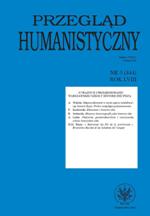Miejsce ekonomii w moim ujęciu intelektualnej historii Rosji. Próba zwięzłego podsumowania
The Place of Economy in My Views on Russian Intellectual History. An Essay in Self-Interpretation
Author(s): Andrzej WalickiSubject(s): Cultural history
Published by: Wydawnictwa Uniwersytetu Warszawskiego
Keywords: wspólnota; społeczeństwo; kapitalizm; socjalizm; marksizm; narodnicy; modernizacja; zapóźnienie historyczne; konieczność historyczna; królestwo wolności; rewolucja; utopia; Rosja; Zachód; rynek; planowość; rolnictwo; przemysł; ruch rewolucyjny; państwo
Summary/Abstract: The present article was meant to be a contribution to the ongoing discussion on the so-called Warsaw School of the History of Ideas which was prominent in the Polish intellectual life in the 1960s. The author was one of the founding members of this school, but his position in it was in many respects peculiar and untypical. It has been noticed that one of the specific features of his research was a systematic study of the interconnection between philosophical/religious ideas and the ideologies of the economic growth. The author confirms the validity of this observation and shows that this peculiarity of his contribution stemmed mostly from the fact that the main subject-matter of his research has been the intellectual history of a single “developing country” – namely Russia, from the Enlightenment to the revolutions of 1917. It was a period when the Russian intellectuals eagerly sought to discover the “meaning” of their history, trying to show that Russian backwardness and peripheral status was a potential privilege, enabling a free, conscious choice of historical future. The problem of this peculiar “privilege of backwardness” (to use Alexander Gerschenkron’s expression) provided a direct link between the historiosophical (secular and religious) ideas and economic problems of the Russian intellectual life. Because of this, economic problems became a part and parcel of the Russian intellectual history. In the last quarter of the 19th century economic discussion between the Russian Populists and the Russian Marxists dominated the entire intellectual scene, providing the central framework for nearly all fields of intellectual activity. The article shows how these problems were dealt with in the author’s various books: from The Slavophile Controversy (1964), through The Controversy over Capitalism (1969) and A History of Russian Thought (Polish edition 1974; English edition 1979), to Marxism and the Leap to the Kingdom of Freedom (1995). The first of these books dealt with the problems of intellectual and social modernization, as reflected in the classical dispute between Russian Slavophiles and Westernizes. The second one (The Controversy over Capitalism, translated into several languages and particularly influential in Japan) was devoted to the debate between the Russian Populists and the Marxists, concerning the possibility of Russia’s “non-capitalist development” – a possibility advocated by the Populists and rejected by the Marxists (despite the fact that Marx himself took the side of the Populists, backing it by a coherent theory of non-capitalist modernization). The last book discussed the problem of Soviet economic planning, showing that it became an instrument of speeding up the economic growth only under Stalin. Earlier it was seen only as a means of establishing communism through the removal of the “anarchy of the market” and replacing it by rational control over economic forces by the conscious will of the
Journal: Przegląd Humanistyczny
- Issue Year: 444/2014
- Issue No: 03
- Page Range: 5-45
- Page Count: 41
- Language: Polish
- Content File-PDF

